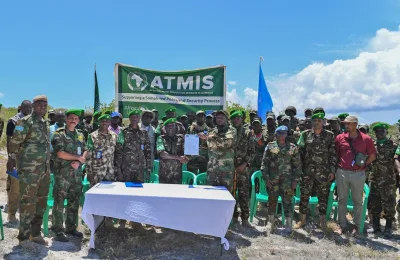After more than a decade of covert operations, U.S. activity in Somalia sprang into life this…

After more than a decade of covert operations, U.S. activity in Somalia sprang into life this week with two high-profile assaults on the militant group Al-Shabab.
First, the Pentagon confirmed a series of drone and manned air strikes on an Al-Shabab training camp in Hiran, south-central Somalia, on March 5. The U.S. claimed that at least 150 militant recruits were killed in the strikes, though Al-Shabab disputed the death toll. The strikes were quickly followed up by a daring helicopter raid overnight on Tuesday, when joint U.S. and Somali forces assaulted a base held by the militants in Awdigle, south of Mogadishu. Again, the death tolls were a matter of dispute, with Somali government officials claiming as many as 15 fighters were killed but the armed group saying there was only one casualty.
Even if the U.S. does not carry out another single operation in Somalia in 2016, these two incidents make it the deadliest year in terms of casualties inflicted by American forces in the Horn of Africa state in almost a decade. But Washington plainly has many other pressing foreign policy engagements—the U.S. is leading a grueling bombing campaign against the Islamic State armed group (ISIS) in Syria and Iraq (and, increasingly, in Libya) and is also providing tactical support in the fight against Boko Haram in West Africa. So why is the U.S. bothering with Somalia at all?
Part of the answer lies with the African Union (AU). The body’s military force in Somalia—AMISOM—is looking increasingly incapable of dealing with a resurgent Al-Shabab by itself. The 22,000-strong multinational force successfully drove the militants out of major cities in Somalia, including the capital Mogadishu in 2011. But in the past year, the momentum appears to have shifted, in particular with three instances of Al-Shabab fighters overrunning AMISOM bases in Somalia.
In June 2015, militants killed at least 50 Burundian soldiers and took control of their AU base at Leego, 130 kilometers (81 miles) south of Mogadishu. A few months later, the group overran the AU base patrolled by Ugandan soldiers in Janale, southern Somalia, claiming to have killed 70 soldiers in the process. Finally, in January, Al-Shabab militants besieged the El Adde base in the Gedo region of Somalia, close to the Kenyan border. Somali President Hassan Sheikh Mohamud recently admitted that Al-Shabab may have killed up to 200 Kenyan soldiers in the raid, which would constitute the one of the single greatest losses of life in Kenyan military history. (Kenya has so far declined to give a definitive death toll for the attacks.)






